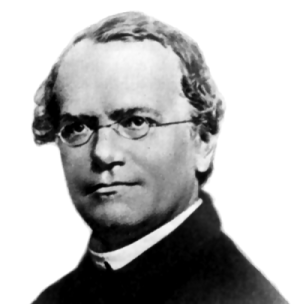Gregor Mendel was an Austrian-born scientist and friar who was recognized after his death as the founder of the science of genetics. During his lifetime, his work was largely ignored by his fellow biologists. Mendel discovered laws of inheritance that dictate how various traits pass down the generations in plants. These laws were rediscovered, independently of Mendel’s pioneering work, in the 20th century.
Mendel’s Early Life
Mendel was born in Heinzendorf, then part of Austria, on July 22, 1822. After a local elementary education, he was sent to Troppau to undertake a more demanding secondary education on the recommendation of an impressed local teacher. Mendel did not find the move easy, but he was an excellent student and graduated with honors in 1840.
Afterward, he enrolled at the University of Olmütz, excelling in mathematics and physics. He was often short of money, and became a part-time tutor to keep himself afloat. He was badly afflicted with depression, but always returned to his studies and graduated in 1843.
Later that year, Mendel decided to part from his family’s farming tradition and joined a seminary for priests. He went to Brno’s Monastery of St. Thomas, which was run by the Augustinians. The monastery had a considerable regional reputation for culture and learning, and Mendel spent much of his time in the building’s large library and research rooms.
However, the hard life of a friar proved difficult for him personally, and he suffered a breakdown in 1849. Mendel failed an exam to become a teacher; instead, he was sent to Vienna to continue his scientific studies at the University of Vienna.
Mendel’s Studies on Heredity
After finishing at Vienna in 1853, Mendel went back to Brno and became a teacher in the area. While undertaking the post, he started to conduct what would become his most famous experiments. He did research into plant hybrids, particularly peas as they were simple to reproduce, and discovered that the largely accepted theories of the day – including the idea that hybrids would eventually revert to their original forms – were incorrect.
Mendel’s research was carried out over a period of some years, and made use of thousands of plants, whereas the earlier experimenters had often conducted only short-term tests with a much smaller sample.
Mendel cross-fertilized peas which were entirely unlike in character and came up with what he called the Law of Segregation. This established the notion of regressive and dominant traits in each organism, which are randomly transmitted to the next generation. He also came up with the Law of Independent Assortment; this stated that each trait could be passed on regardless of which – if any – other parental traits had continued down the generations. Mendel suggested, correctly, that heredity of this kind was a matter of statistical laws, and that not only peas but other living things possessed such traits.
Publishing the Findings
The Natural Science Society in Brno heard two lectures by Mendel in 1865, but although the society published his findings in its journal, Mendel undertook little promotional activity. Historical records suggest that he also failed to correct other scientists who misinterpreted his results, especially the notion that Mendel was simply underlining the existing theories, rather than – as he had in fact done – showing that they needed radical alteration.
Even Mendel himself was doubtful that his work could be applied generally, and it was only much later that it was shown beyond doubt that heredity of the sort he discovered was indeed of universal application.
Later Life and Legacy
Still at the secondary school where he had taught for almost a decade and a half, Mendel was elected its abbot in 1868. This post, although a prestigious honor, required him to carry out a good deal of administrative work, and this hampered his scientific research.
By now, his eyesight was also beginning to fail significantly. He gradually withdrew from public view, traveling only rarely. He caused some controversy in 1874, when he made known his strong opposition to a law which funded the Church’s costs by substantially raising the monastery tax.
Mendel died on January 6, 1884. Although many people came to his funeral, most of these had some personal connection with him, and the importance of his scientific discoveries was still largely forgotten.
In 1900, a group of botanists replicated Mendel’s findings, only discovering later that Mendel himself had published the same results more than 30 years earlier. Questions arose about how well Mendel’s results fit in with the theories of evolution propounded by Charles Darwin, and Mendel’s work experienced periods of favor and disfavor. However, his underlying theories and his research itself have remained crucial to the understanding of modern genetic theory.
